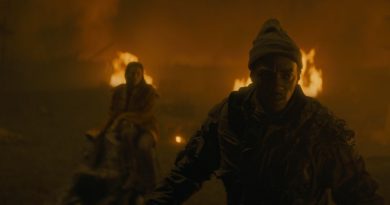Captain America: Civil War (12A) | Close-Up Film Review

Dir. Anthony and Joe Russo,US,146 mins,2016
Cast: Chris Evans, Robert Downey Jr, Scarlett Johannson, Anthony Mackie, Sebastian Stan
If you take 2008’s Iron Man as the birth of the Marvel Cinematic Universe, then my Vision style mathematic skills would make our second comic-book versus skirmish in a matter of months the twelfth instalment in this sprawling world of spandex and glowing blue maguffins. Superhero fatigue is an oft-discussed crippling genre condition, and after Dawn of Justice managed to furrow its brow so far into its own glum face that it ended up staring out of its own arse, Captain America, a franchise whose Winter Soldier instalment is widely regarded as the series benchmark, saves the day in so many more ways than simply being a superb, plate-spinning blockbuster.
Perhaps responding to the seemingly endless 3rd act action mechanics of “large things slowly falling from the sky”, the Avengers are being arm twisted into signing a treaty to prevent the heroic collateral damage seen at the battles of New York, Washington, and Sarkovia. Prompted by a chance meeting with one of the fall-out victim’s mothers, Tony Stark (Downey Jr) is pro-control, seeing it as a chance to continue his semi-retirement, and get the public back on the side of the maligned superheroes. This goes against Steve Rogers’ (Chris Evans) overwhelming sense to “do good” in a reactive fashion, rather than be given orders by William Hurt’s returning Secretary of State Ross.
Political conflict soon gives way to personal, as a fatal bombing in Lagos unearths a familiar face in Bucky Barnes (Sebastian Stan), aka The Winter Soldier, causing divisions within the Avengers that ripple irreparably out-of-control.
It seems unfair to rag on the shredded capes of Batman Vs Superman, but THIS is how you do moral conflict; genuine stakes and an ambiguous resolution between two sides, neither of which has a clarity of argument or a bias towards which character to root for. It’s the kind of polemic usually reserved for political thrillers, but here are the foundations of a dialogue driven blockbuster.
It’s credit to Christopher Markus and Stephen McFeely that their screenplay manages to have so many resonant beats amongst some big action set-pieces, so-much-so that Civil War is a film in which you long for the next character exchange rather than, albeit impressive, big screen spectacle.
Roberty Downey Jrs recruitment of a certain Sony-fudged webslinger (a note-perfect Tom Holland) is handled superbly, with the Iron Man actor on never-better franchise form, letting the mask metaphorically slip as he struggles with all of the relationships in his life. His scenes with Evans, who despite the litany of characters, always remains the focus, are pure Shakespeare; layered with tragedy, brotherhood, and a burgeoning sense of impending doom. This is the first time you’ve really given a damn about the fate of the Avengers, and it’s not because of some “big bad”, it’s because of each other.
Despite scene stealing moments from Paul Ant Man Rudd, and a wonderful introduction to Chadwick Boseman’s Black Panther, Scarlett Johannson stands out as the films MVP, and it remains a frustration that they’re so intent on giving Spider-Man five films to get the character right, yet eight years in and we’re still waiting for a Black Widow movie to be greenlit.
Keeping it in requisite 4-star Marvel territory is the universe stitching that makes the first hour feel like a load of cogs whirring, not all of them in sync. So many new threads are flung at the story, that it only really untangles the web once Spider-Man enters the fray, and the whole thing becomes fun, a word many a superhero film forgets to adhere to.
Falling somewhere between The Winter Soldier, superior because that feels like a more self-contained narrative, and Guardians of the Galaxy, in terms of merit, Civil War is the calm before the storm of Infinity War, a battle that’ll have to go some way to topping this trilogy cap.
Review by Matthew Rodgers



